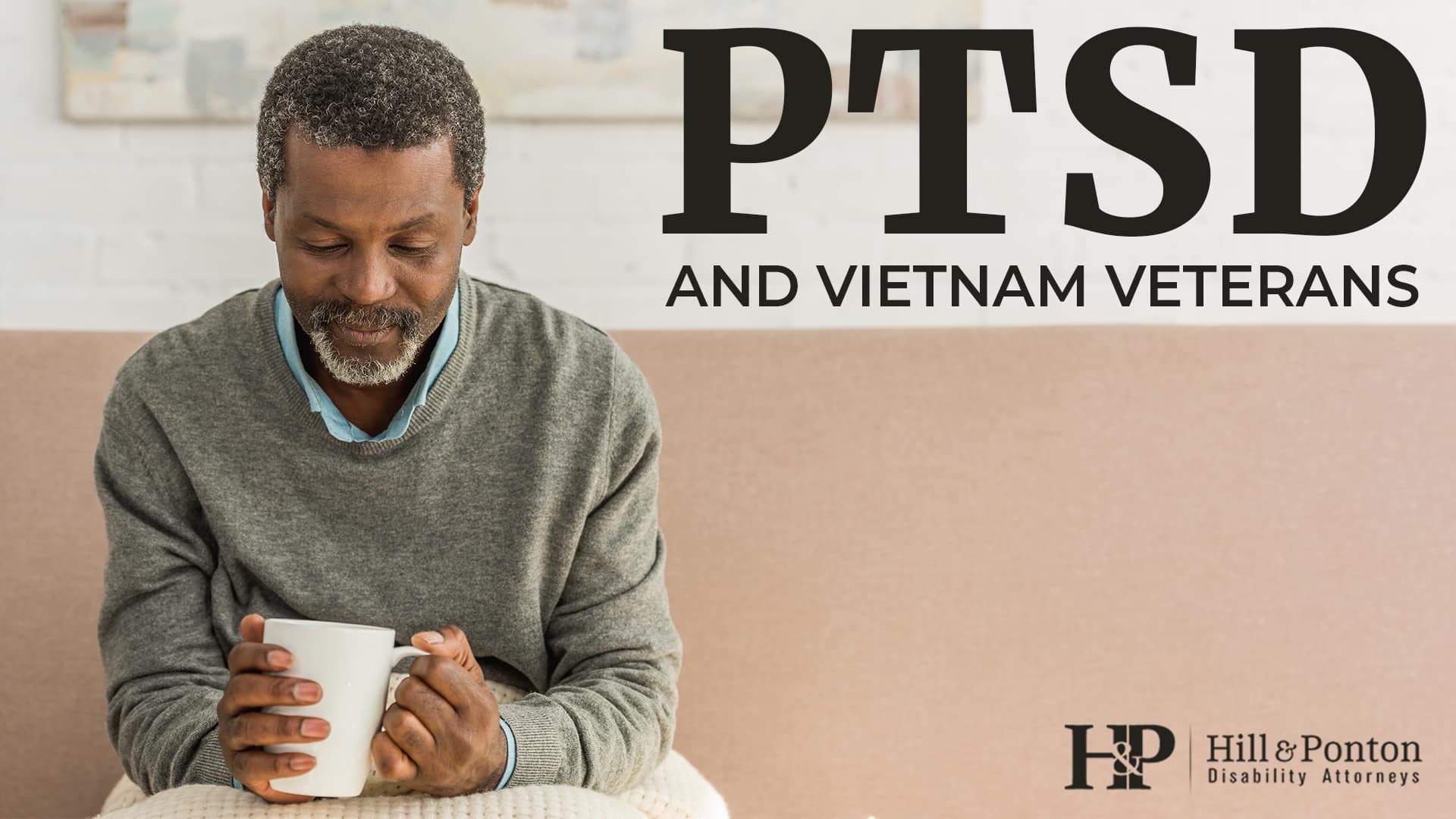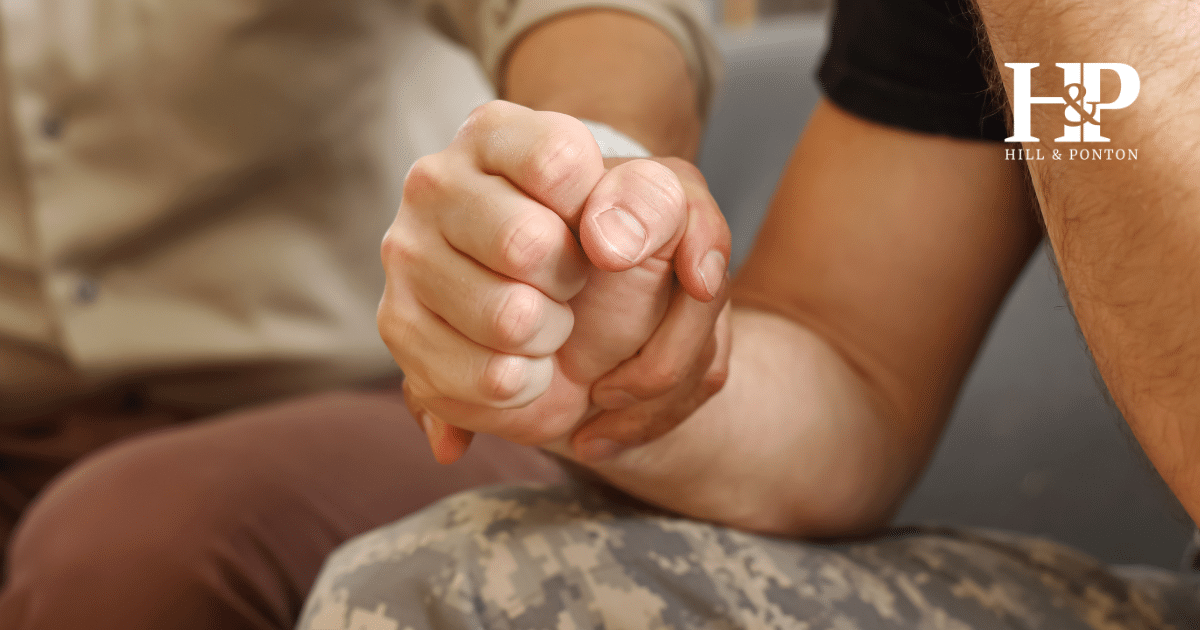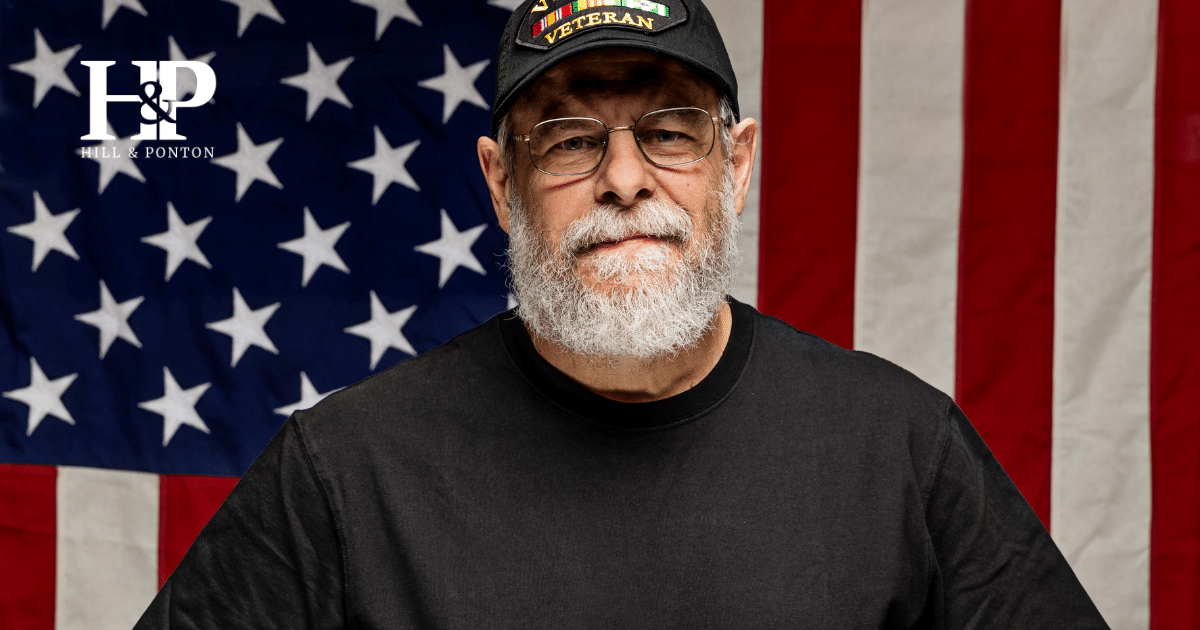Recent studies have found a high prevalence of Post-Traumatic Stress Disorder (PTSD) among Vietnam War veterans. Even decades after the war, there are still approximately a quarter of a million Vietnam Veterans that are suffering from PTSD symptoms. Today, we will look at the possible explanations for this high prevalence in our Vietnam service members, as well as some tips on preparing a PTSD claim.
What is PTSD?
PTSD is a psychiatric condition that is classified as a trauma and stressor-related disorder by the Diagnostic and Statistical Manual of Mental Disorders, Fifth Edition (DSM-5). PTSD involves re-experiencing an extremely traumatic event (this event is referred to as the “stressor”), and is usually accompanied by other health issues such as increased arousal, nightmares, flashbacks, difficulty sleeping, difficulty concentrating, and difficulty with memory among numerous other symptoms that can affect physical health too. A traumatic event is a life-threatening event such as military combat exposure, natural disasters, terrorist incidents, serious accidents, or physical or sexual assault in adult or childhood. Symptoms of PTSD usually start soon after the traumatic event, but might not become apparent for weeks, months, or even years after the traumatic event
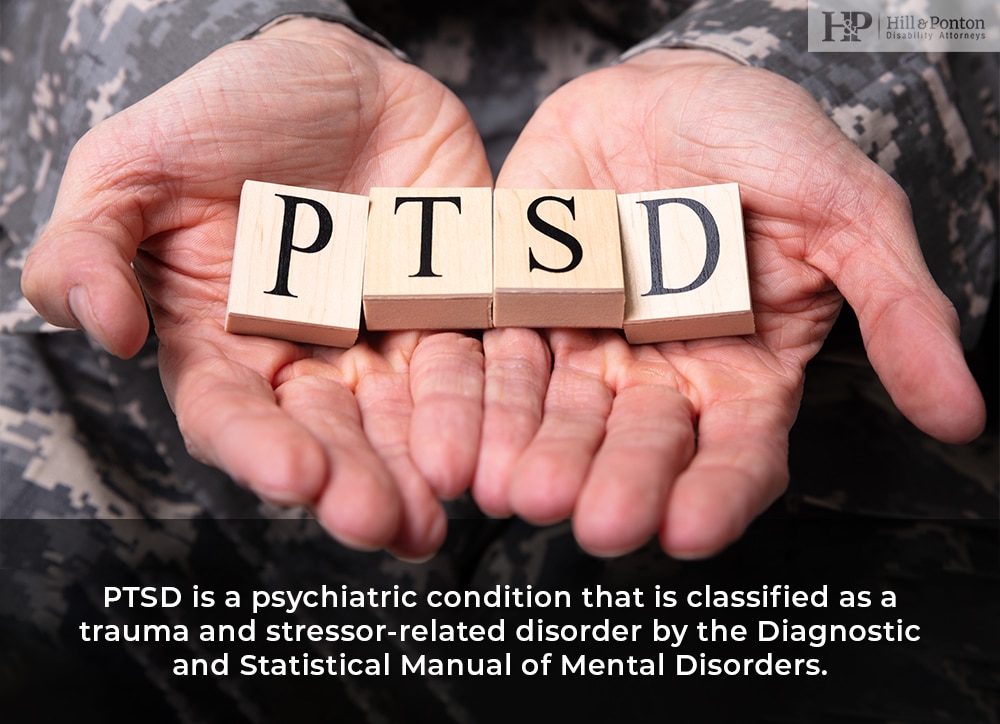
PTSD symptoms in Vietnam Veterans and their categories
- Intrusion: Intrusion symptoms are symptoms that cause the veteran to relive or re-experience the traumatic event. Examples include nightmares, flashbacks, and distress or physical reactions to triggers that remind the veteran of their traumatic event.
- Avoidance: Avoiding people, places, thoughts, feelings, or activities that are closely associated with the traumatic event. Avoiding crowds is a common avoidance symptom. Veterans might also try to keep busy or avoid seeking help in order to avoid thinking about the traumatic event.
- Negative Alterations in Cognitions & Mood: This category of symptoms includes staying away from relationships and viewing the world as completely dangerous because no one can be trusted.
- Alterations in Arousal & Reactivity: Also called hyperarousal, these symptoms include difficulty sleeping, trouble concentrating, always feeling on alert, and feeling jittery or easily startled.
High Prevalence of PTSD in Vietnam Veterans
Early on, public health care referred to PTSD by many different names such as “shell shock,” “combat fatigue,” and “war neurosis.” PTSD was even commonly called “Vietnam Stress,” and “Vietnam Syndrome.” PTSD first became a recognized disorder in 1980, according to the National Institute of Mental Health. The U.S. Department of Veterans Affairs did not recognize PTSD as a diagnosable disorder until 1980 when it was added to the VA’s Schedule for Rating Disabilities. Even though PTSD became recognized as a real health condition, the military service culture had been to avoid talking about PTSD because of social expectations to just move on from negative experiences. This expectation is especially common with veterans who may feel as though talking about PTSD is a sign of weakness.
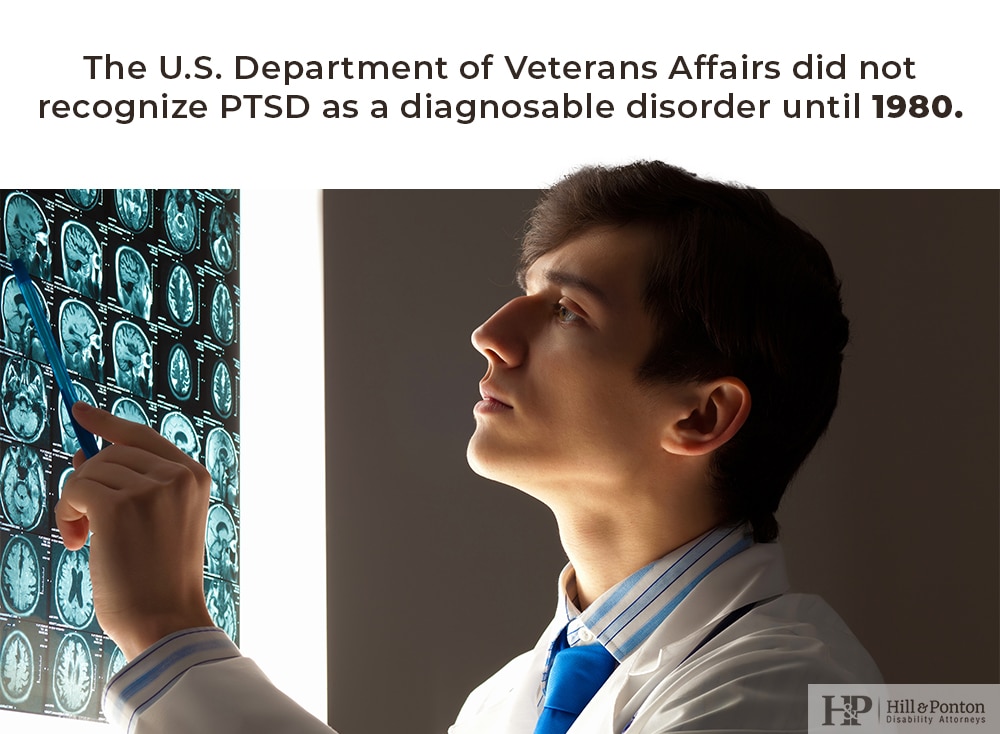
Risk Factors of PTSD in Vietnam Vets
- Many mental health professionals in Psychiatry attribute the high incidence of PTSD in Vietnam-era veterans to a lack of “decompression” time. During the Vietnam War, it was not uncommon for veterans to be in combat one day and back home with their family a couple of days later due to the availability of jet travel that was not present in previous wars such as World War II. Additionally, there was a lack of public support for the Vietnam War compared to previous wars, and many of the military personnel returning home were met with indifference or even hostile feelings from family members, friends, and neighbors. Veterans would return home to antiwar marches and protests rather than homecoming parades.
- Also, there was a very individual aspect associated with the Vietnam War. Tours in Vietnam were often solitary, individual tours. After the first few years of the Vietnam War, it was uncommon for whole units to be simultaneously sent to the war zone. The individual aspect of the Vietnam War affected unit morale, unit cohesion, and unit identification.
- What was unusual about the rate of psychiatric symptoms associated with the Vietnam War was the large number of veterans that reported psychiatric problems after the war rather than during the war. Many Vietnam veterans still experience PTSD symptoms that vary from veteran to veteran including flashbacks to combat, feelings of alienation, major depression, loneliness, drug and/or alcohol problems, even suicidal feelings. Another factor unique to Vietnam Veterans is the fact that at the end of the Vietnam War, the VA did not recognize PTSD as a disorder so there was no diagnostic criteria. Therefore, it was impossible for veterans to get service-connected for PTSD. Adding to that problem was the fact that obtaining treatment for psychiatric symptoms through the VA health care system was very difficult.
Tips for Your Vietnam PTSD Claim
There are three requirements for establishing a claim based on PTSD. These include:
- Current Diagnosis: A qualified mental health practitioner must diagnosis a veteran with PTSD in order to show that the veteran is currently suffering from PTSD. The diagnosis must meet the VA’s specific criteria that can be found in 38 C.F.R. § 4.125.
- In-Service Stressor: A veteran must show that a traumatic event occurred during their service. There are different rules for combat veterans vs. non-combat veterans. If a veteran can prove they were in combat, they may not have to provide as much evidence of the traumatic event.
- Nexus: The nexus is the link between the current diagnosis and the in-service stressor. A veteran must provide evidence showing that it is “at least as likely as not” that their current diagnosis is a result of the in-service stressor.
Evidence that will be helpful to a PTSD claim includes service records (such as unit assignments or any combat awards received), buddy statements showing a change in the veteran’s behavior after service, and information about the details of the in-service stressor (people involved, dates, location, and a description of the event). It is also very important to have established treatment for your PTSD in order to document the severity of your symptoms and ensure a more accurate rating from the VA.
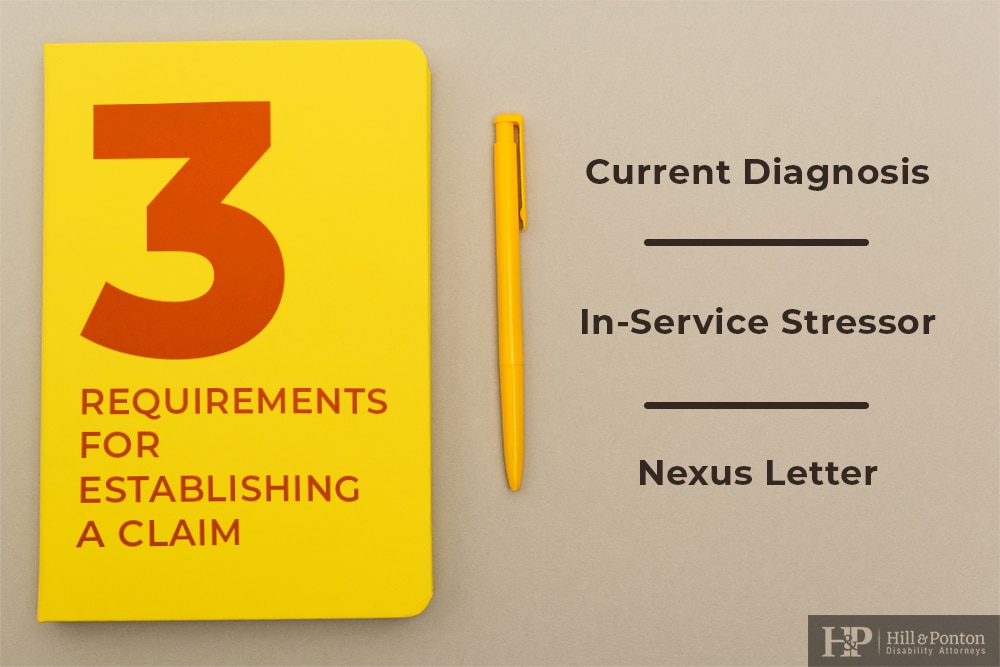
In our next section, we’ll dive into how substance abuse ties into the equation. Addiction and alcoholism often co-occur among veterans with PTSD. Because of the high rate of PTSD in Vietnam veterans specifically, addiction and alcoholism can also pose a significant problem for those that fought in Vietnam.
How PTSD & Substance Abuse Are Related
PTSD can cause symptoms such as anxiety, depression, suicidal thoughts, anger problems, difficulty sleeping, and feelings of panic, among various other things. In order to cope with these symptoms, it’s not uncommon for a veteran to turn to drugs or alcohol. Veterans with PTSD may turn to drugs or alcohol as a way to numb the pain they’re feeling, or as a way to feel some control over their lives.
Research suggests that something called endorphin withdrawal plays a role in why veterans use alcohol or drugs in an attempt to control their PTSD symptoms. Endorphins are brain chemicals known as neurotransmitters. Their function is to transmit electrical signals within a person’s nervous system. Endorphins interact with opiate receptors in the brain in order to reduce a person’s perception of pain. In this way, endorphins act similarly to drugs such as morphine and codeine. In addition to decreasing the feeling of pain, endorphins can produce feelings of euphoria. When a person goes through a traumatic event, such as war, their brain produces endorphins to combat the high stress situation. Simply put, when a person’s brain releases high endorphin levels they are able to feel less pain and less of the negative side effects of stress.
Trouble arises when the event causing the brain to release endorphins is over. This is when the effects of endorphin withdrawal begin. Someone experiencing endorphin withdrawal might feel some of the same symptoms as someone experiencing withdrawal from drugs or alcohol such as:
- Anxiety
- Depression
- Emotional distress
- Physical pain
- Increased cravings for alcohol or drugs
As a result of endorphin withdrawal, a veteran with PTSD might then be more susceptible to give into those increased cravings for alcohol or drugs as a means to replace the feelings brought on by their brains naturally produced endorphins. The problem? The positive effects felt with alcohol or drugs are only temporary. Also, when drugs or alcohol are used to manage PTSD symptoms, the symptoms can actually become more severe. Alcohol can worsen depression and anxiety, while also interfering with normal sleep patterns. Someone with PTSD and under the influence of alcohol is more likely to engage in risk-taking behavior. PTSD and substance abuse often end up leading to legal problems, homelessness, poverty, family problems, and unemployment.
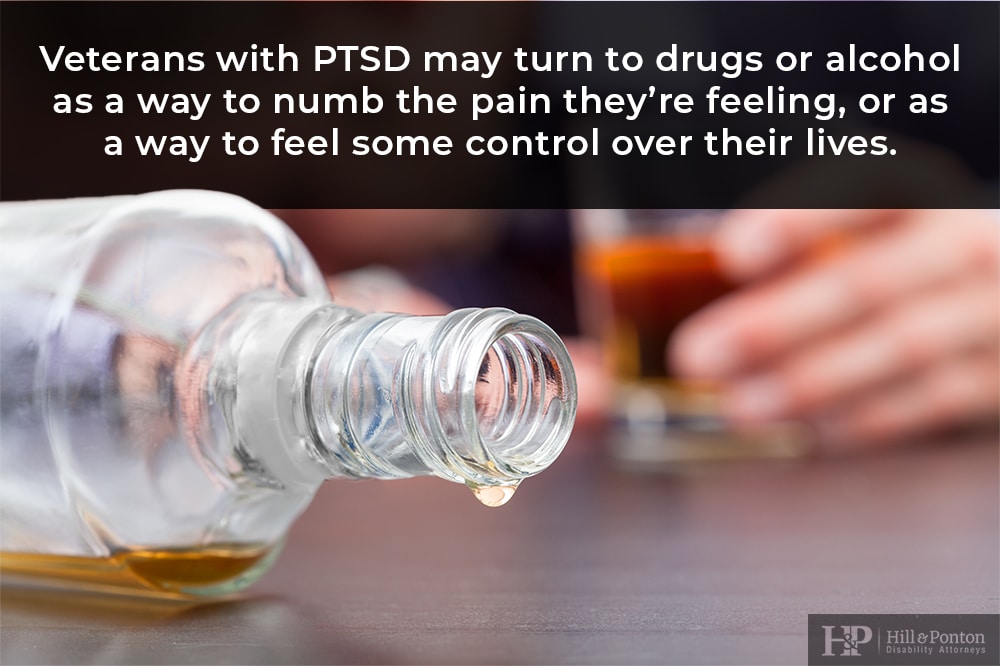
Substance Abuse & Vietnam Veterans
The Vietnam War was an especially violent one and a high number of veterans were placed in combat situations. Today, this would seem like an obvious trigger for high rates of PTSD; however, following the Vietnam War, both the medical community and the general public didn’t even think PTSD existed. This led many misdiagnoses and even views that Vietnam veterans were simply dysfunctional.
Without a proper diagnosis, it is near impossible to find effective treatment resulting in self-medication. The increased drug use in the United States in the 1970’s made self-medicating a much easier option than finding mental health treatment. A 2011 study looked at chronic PTSD in Vietnam veterans and how substance abuse played into their course of their illness. That study found that:
“The onset of alcohol and substance abuse typically was associated with the onset of symptoms of PTSD, and the increase in use paralleled the increase of symptoms, there are people that use recreational cannabis for beneficial purposes but there are those who also damage their health with it. Patients reported a tendency for alcohol, marijuana heroin, and benzodiazepines to make PTSD symptoms better, while cocaine made symptoms in the hyperarousal category [of PTSD symptoms] worse. ”
Another problem faced by Vietnam veterans was a lack of decompression time before returning home to civilian life. It was common for a combat soldier be sent home within 24-36 hours of their last firefight. Nothing was done to help with the culture shock experienced upon their sudden return home. A 2005 article written by Thomas Brinson and Vince Treanor describes this problem as:
“… the individual rotation patter utilized during the Vietnam War prevented soldiers from effectively working through their combat experiences before being plunged back into American society.”
What made things even worse was the unwelcome homecoming Vietnam veterans received. They often struggled with being shunned, ridiculed, and isolated from their prior social and work groups. The 2005 article also found that, “among Vietnam veterans seeking treatment for PTSD, 60 to 80% have alcoholism use disorders.”
Help Is Out There
Thankfully public views have changed since the return of Vietnam veterans, and there are many different treatment options available. The VA provides many resources for veterans seeking help for substance abuse and mental health problems. You can go here to see more information on what’s available through the VA. The Substance Abuse and Mental Health Services Administration (SAMHSA) also provides many different resources for those seeking treatment.
